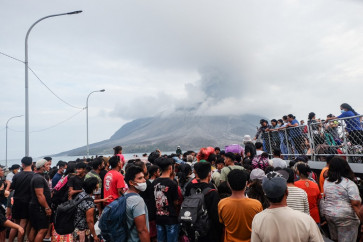Fuel Policy: Fiscal savings to be spent on infrastructure
The government will allocate up to Rp 140 trillion (US$11
Change Size

T
he government will allocate up to Rp 140 trillion (US$11.5 billion) from fuel subsidy savings to develop agricultural infrastructure in a bid to attain self-sufficiency in key crops in the next three to four years.
Finance Minister Bambang Brodjonegoro said on Tuesday that the government would allocate around Rp 16 trillion from the state budget next year to develop the irrigation system and to build dams to support the program.
'The country's irrigation system is massive, but the ditches are not well maintained and around 40 percent of them are damaged. With the President's focus on farmers and food security, the irrigation system will become our priority,' Bambang told a press conference.
The minister said the government would also increase spending on fertilizer and seed subsidies for farmers.
He added that in general, infrastructure would take the largest portion of the fiscal saving, including sea-based transportation infrastructure and the building of fishing boats to support the realization of the maritime axis scheme.
'In the government's energy security program, the main focus will be the development of the country's gas distribution network both for domestic and transportation use, as we have to diversify the energy used for transportation,' Bambang said.
'The most sensible option is converting [fuel] to gas,' he continued.
He added, however, that the government had not yet decided the amount of money to be assigned to infrastructure projects apart from the irrigation system.
Meanwhile, in his speech at the National Resilience Institute's (Lemhanas) annual training, President Joko 'Jokowi' Widodo said the government currently allocated Rp 714 trillion from the state budget to fuel subsidies.
'We could build 1,400 dams with the money,' Jokowi said. 'Why don't we? Because we have been burning [the money] every day [for fuel].'
The government is planning to build 11 dams next year to help realize self-sufficiency in rice, the country's staple food, in less than four years.
Indonesian Employers' Association (Apindo) deputy chairman Franky Sibarani welcomed the government's move to raise the subsidized fuel price by Rp 2,000 per liter, lower than the Rp 3,000 per liter anticipated by the group, saying that it would benefit the economy in the longterm, particularly as the poorly targeted subsidies could be channeled to other posts, such as developing much-needed infrastructure to push down the country's high logistics costs.
'We appreciate the new government's courage in enacting such an unpopular policy and prioritizing broader economic interests ahead. We think it's a painful but necessary step to make our economy more efficient,' he told The Jakarta Post.
As the industrial sector used unsubsidized fuel, Franky added, the impact of the fuel-price hike would likely be minor.
' Linda Yulisman
contributed to this story









